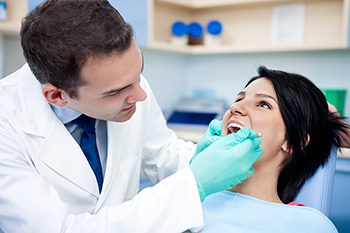
You may be wondering about the difference between having a regular check-up exam and a complete oral exam. During a check-up exam, your dentist will perform a check to monitor your oral health, address any concerns and have dental Xrays updated if they are out of date.
A complete oral exam is much more involved, by comparison to the check-up exam. Think of the regular check-up exam as more of a monitoring exam after the in-depth oral health information is gained from the complete oral exam. It is recommended to have a complete oral exam every 3 to 5 years, or more frequently if there are any dental concerns or increased risk factors. You may also hear a complete oral exam referred to as a comprehensive oral exam. Listed below are the major components of a complete oral exam.
What Is Involved in a Complete Oral Exam?
- Creating a new medical and dental history form, recording any medical conditions, medications, past surgeries, allergies, etc.
- Addressing any concerns regarding aesthetics or function
- Completing an extra-oral exam to check for any skin or lip abnormalities
- Completing an intraoral exam to check the health of the gum tissues, the throat, tongue, cheeks and palate
- An oral cancer screening
- A check of the temporomandibular joint to assess for proper function
- Checking for signs of clenching and grinding
- Any Xrays if they are required to check for cavities, bone level, infections, wisdom teeth, etc.
- Updating the odontogram to record teeth, fillings, crowns, missing teeth, bridges, implants, chips or fractures, rotations, etc.
- Updating the periodontal charting, checking teeth for signs of gum disease
- Giving oral hygiene recommendations for at-home regimen
- Making any necessary referrals to a specialist if necessary
- Diagnosis of cavities and determining the need for restorative work
- Assessment of the health of previous dental restorative work
- A custom-made treatment plan based on the patient’s oral health needs
It is essential to have your complete oral exam every few years, or more frequently if there is a need. A comprehensive oral exam allows your dentist and dental hygienist to explore findings that may not be addressed with a check-up exam. If you believe you are due for your complete oral exam or have any questions about them, we encourage you to contact us today to schedule an appointment.
